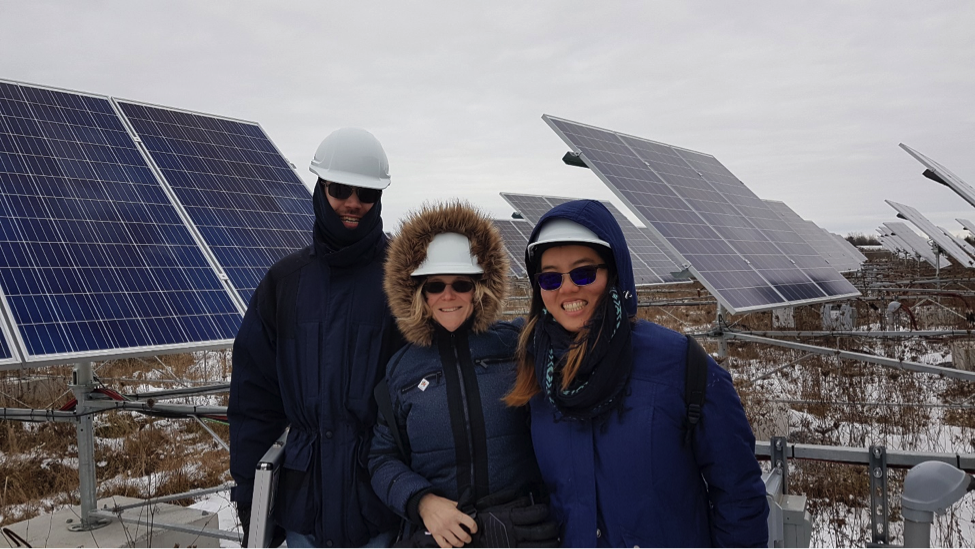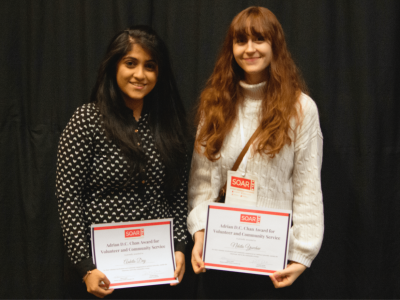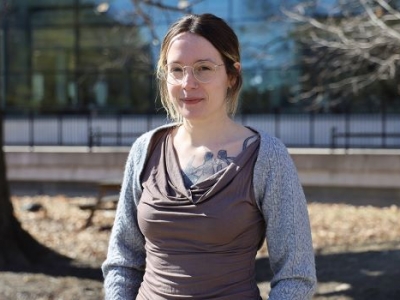Creating and executing renewable energy plans and projects involves both policymakers and engineers. Nathalin Moy, a new alumna (Master of Arts student in Sustainable Energy), is exploring how to improve the public engagement process for renewable energy projects to come.

Profs. Craig Merrett and Alexandra Mallett, with Nathalin Moy
The Sustainable Energy Engineering and Policy program is a collaboration between several engineering departments within the Faculty of Engineering and Design and the Faculty of Public Affairs’s School of Public Policy and Administration. On the engineering side, students pursue an MASc or an MEng in Sustainable Energy , and on the policy side, students pursue an MA in Sustainable Energy. The program is unique in that there is a fair bit of collaboration between the two disciplines in terms of course offerings and through some opportunities for research. For instance, in addition to Moy’s thesis jointly supervised by faculty members from engineering and policy, engineering students take a policy course, policy students take an engineering course, and there are a few courses that both groups of students take together.
Moy’s thesis, An Engineer’s Guide to Public Engagement in Renewable Energy Projects, examines current public engagement processes for renewable energy projects, focusing on the extent to which public engagement factors into the technical design of the projects. Moy successfully defended and submitted her thesis this past January, which will allow her to graduate this Winter.
“The thesis is interdisciplinary, drawing on research from both engineering and the social sciences,” explained Moy. “It culminates in eight guidelines directed to engineers looking or needing to incorporate public engagement into their design processes for renewable energy projects.”
“The research clearly showed that current public engagement processes for renewable energy projects are inadequate,” shared Moy. “To address this, policies around public engagement need to be revamped, and engineers need to better consider public engagement in their design processes. The guidelines presented in the thesis help engineers with this, but they can also inform new policies.”
Moy’s research is a step towards making public engagement processes more effective, leading to renewable energy projects that are more meaningful to the communities in which they are situated.
Moy came to Carleton because the Sustainable Energy program presented the opportunity to pursue interdisciplinary research at the intersection of energy, engineering, and policy. Her thesis evolved from the work she did as a research assistant with Dr. Alexandra Mallett from the School of Public Policy and Administration and Dr. Craig Merrett from the Department of Mechanical and Aerospace Engineering who both supervised her thesis.
“Part of the thesis is a case study of the renewable energy landscape in the area surrounding Kingston, Ontario,” Moy explained. “The case study is part of a project that my two supervisors are working on, which will eventually become a book chapter.”
“Each of my supervisors guided me through the research specific to their individual areas of expertise, ensuring every relevant piece of information was covered,” expressed Moy. “Since I have training in both engineering and policy, I was able to make the connections between the two disciplines and present the interdisciplinary research in a cohesive manner.”
Dr. Mallett and Dr. Merrett also helped to find the examiner for Moy’s thesis defence: Zach Colbert from the Azrieli School of Architecture and Urbanism. “Being neither an engineer nor a policy expert, he was the perfect candidate to test whether I had written my thesis to be universally accessible,” Moy said. “His positive feedback reassured me that while my work is wide-ranging and complex, it can be understood by anyone, which was my goal from the outset.”
Moy recently graduated from Carleton and is looking to work with the federal government where she can apply her education and research to current and emerging energy policy issues.
–The above story was written by Taia Goguen-Garner.
Wednesday, February 12, 2020 in Grad Student Research, News
Share: Twitter, Facebook




